Neem oil is an organic and biodegradable liquid made by crushing Neem seeds, and it is quite valuable in the garden. It can be utilized all year as an insecticide, fungicide, and pest control.
It is a commonly used pesticide in the U.S. because it is inexpensive and safe for use near children and pets. Along with numerous neem oil uses around the house, use neem oil for plants and neem oil for your garden.
Neem oil has been used for over 5,000 years in India. The Azadirachta Indica tree or Neem tree produces the healing herb. The neem leaf makes up over 75% of the Ayurvedic medicinal remedies used in India to treat illnesses.
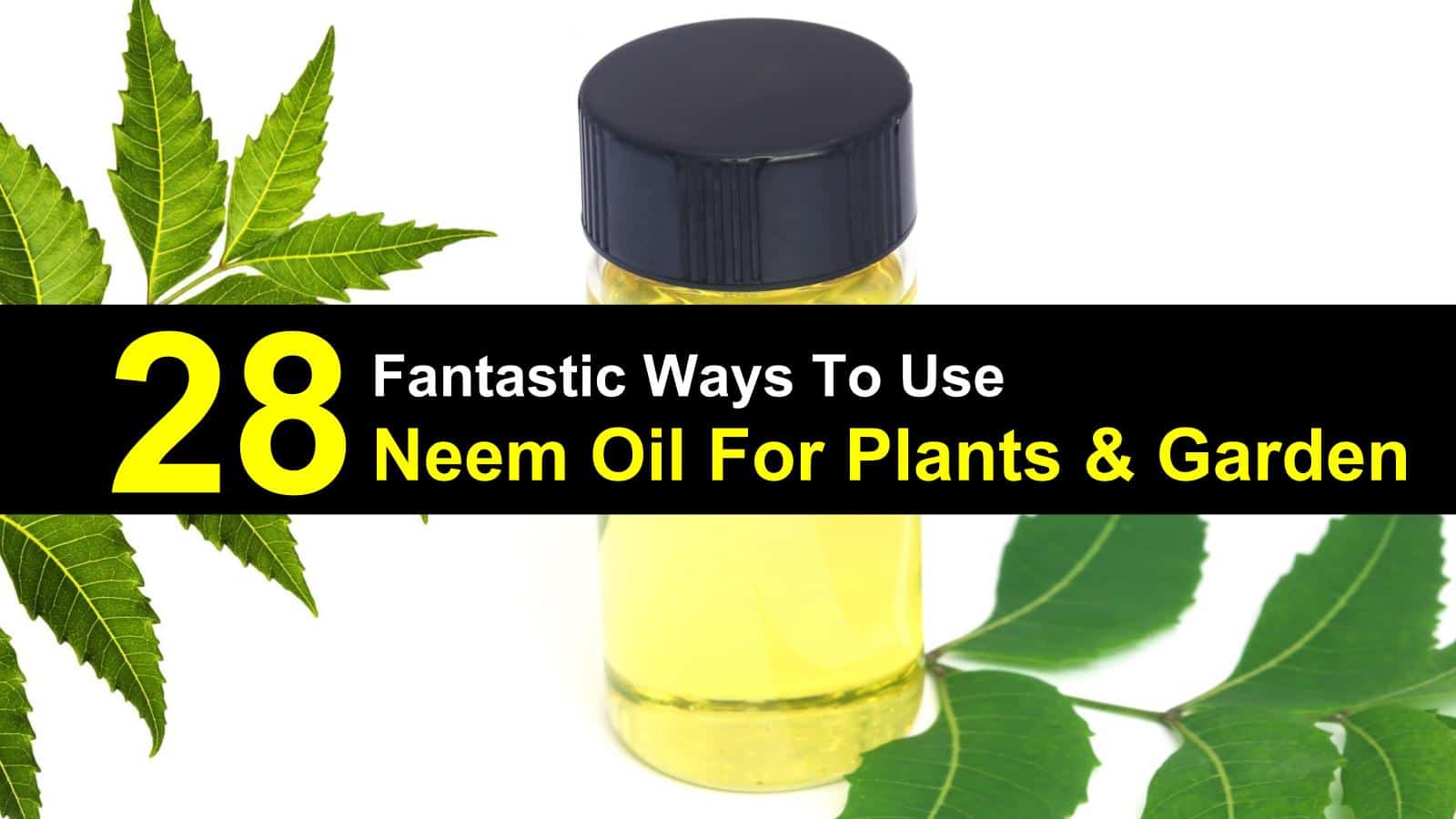
- How to Make Neem Oil Spray for Plants
- Neem Oil for Plants
- Kills Spider Mites
- Get Rid of Aphids
- Kill Whiteflies
- Control Japanese Beetles
- Control Lawn Grubs
- Get Rid of Slugs
- Get Rid of Harmful Nematodes
- Kill Cabbage Worms
- Eliminate Codling Moths
- Control Scale
- Controlling Various Types of Adelgid
- Killing Sawflies
- Managing Lace Bugs
- Controlling Chinch Bugs
- Managing Crickets
- Controlling Earwigs
- Manage Flea Beetles
- Eliminate Squash Bugs and Stink Bugs
- Controlling Tent Caterpillars
- Controlling Mealybugs
- Repel Mosquitoes
- Neem Oil for Garden Use
- Treating Plant Diseases with Neem Oil
- How Does Neem Oil Work?
- How is Neem Oil Made?
- Does Neem Oil Have Any Side Effects?
- Is Neem Oil Safe for Pets and Wildlife?
- Are There Different Neem Oil Products?
- Is Neem Oil Harmful to Bees?
- Where Can You Buy Neem Oil?
- Neem Oil Spray Recipes
How to Make Neem Oil Spray for Plants
The Azadirachta Indica is native to India and is one of two species in the genus Azadirachta. In addition to being an excellent product for your skin, organic Neem oil is a favorite Neem product to use in the garden.
Neem oil is the key ingredient in many oil insecticides that act as a repellent, antifeedant, and egg-laying deterrent to insects that harm plants while leaving beneficial insects unscathed.
The benefits of neem oil are numerous and provide a natural alternative to toxic pesticides, so we’re also going to show ways to use Neem oil for apple trees and outdoor plants. Follow these steps for how to mix Neem oil for plants and to use Neem oil as an insecticide and fungicide.
Mix Neem oil with warm water. Don’t use more Neem oil than recommended; a higher concentration is not more efficient. Fill a spray bottle or sprayer with the Neem oil and warm water mixture. Add a few drops of dish soap that is ecologically safe.
Spray each affected plant with the Neem oil solution, whether you use this Neem oil mix for houseplants or for those outside. Cover all sides of the plant, including the underside of the leaves and the stem.
Shake the sprayer regularly to keep the solution mixed. This insect and leaf miner spray effectively gets rid of all the bugs that want to feast on your plants, like your dwarf lemon tree.
You can also spray around the plant so the stem absorbs the Neem oil solution. Do not spray plants with Neem oil if the outside temperature exceeds 90F. High temperatures can result in the leaves curling.
An ideal time to spray Neem oil is in the morning or evening. This is the best way to use Neem oil on lemon trees or any other plant type. Get rid of any remaining solution when you have finished spraying your plants. Neem oil begins to break down after a couple of hours, resulting in a less efficient solution.
Repeat the process every week for five weeks to treat unwanted fungus and rid your garden of insects.
Neem Oil for Plants
It can be challenging to find a safe and non-toxic pesticide that will work for managing and eliminating unwanted pests in the garden while leaving beneficial insects unharmed.
Unlike other natural chemicals available for taking care of insects in your garden, Neem oil insecticide is exceptionally effective for taking care of garden pests without leaving a toxic residue. It works in the same way as diatomaceous earth but works even better to repel future infestations.
Kills Spider Mites
Nearly invisible, spider mites can do substantial damage to plants. They kill the plants by piercing the leaf’s cells and draining the contents. Spider mites are resistant to a broad spectrum of commercial chemical insecticides, making it difficult to rid your yard of the pesky pests.
However, Neem oil contains azadirachtin, a mite-toxic ingredient, that repels new infestations works great to get rid of spider mites, and discourages existing ones from feeding. When you use neem oil for spider mites, it also disrupts the hormones in the mites, leading to an inability to mature and reproduce. Using a Neem oil foliar spray kills spider mites and saves your plants.

Get Rid of Aphids
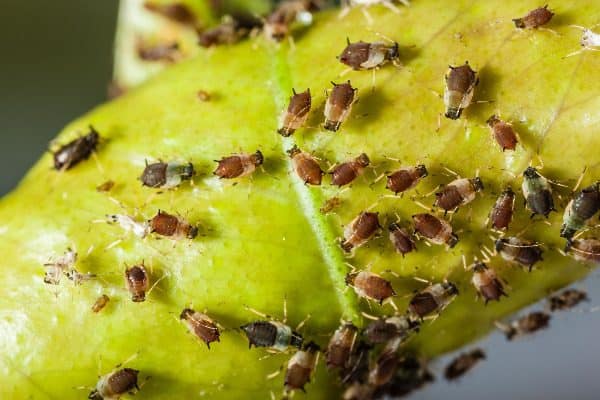
The small, soft-bodied aphids use long, slender mouths to pierce the leaves, stems, and other parts of the plants to suck out the plant’s fluids, leaving you with distorted, yellowing leaves, and stunted growth.
They also discharge a sticky substance known as honeydew, which is a black sooty mold that attracts ants. Control the aphids and the ants that feed on the honeydew, with a Neem oil insecticide. (..) Use Neem oil to kill aphids by spraying them with a mixture of Neem oil, water, and a little dish soap.
Kill Whiteflies
Like aphids, it can be challenging to get rid flies or whiteflies around your house and garden. They gravitate toward warm-weather vegetable plants, including eggplant, tomatoes, cabbage, okra, peppers, and sweet potatoes.
Spraying the affected plants with Neem oil insecticide prevents the insects from growing into adults, and kills the population. Use Neem oil to repel flies on your plants without harmful chemicals.
Control Japanese Beetles
Skeletonized leaves and defoliation are signs that you have a Japanese beetle infestation. When you first see signs of these bugs, spray the affected plants with a Neem oil insecticide. Neem oil will control the pests by reducing their ability to feed on the plants. It doesn’t happen instantly but you should see a big difference within several days.
Control Lawn Grubs
Lawn grubs, the larval stage of Japanese beetles, are very destructive for the lawn. A neem oil based easy-to-make natural grub worm killer works like a charm. At this stage of development, they tunnel under the grass and nibble on its roots, leaving large bare or brown spots in their wake.
For the best results for grub control with Neem oil, spray Neem oil on your lawn in the evening and reapply it after it rains. Spraying your yard with Neem oil will inhibit the growth of the lawn grubs and keep them away from grassroots. (..)
Get Rid of Slugs
If you are having trouble with slugs devouring your lettuce and other leafy crops, Neem oil can help rid your garden of these pests. Slugs love damp, clay soil and are often found hiding in your hedges.
Spraying plants with Neem oil or using a soil drench as a slug killer interferes with the breeding patterns of slugs, resulting in a dwindling population over time. Slug control with Neem oil is easy and the perfect natural way to eliminate these pests.
Use Neem oil as one of the natural ways to kill millipedes, too. They sometimes hide where slugs do.
Get Rid of Harmful Nematodes
Nematodes or eelworms live in garden soil and feed on the roots of your plants. They reduce the plant’s ability to take in water and nutrients they need to survive stresses like drought.
To get rid of these harmful insects, mix Neem oil with the fertilizer you use in your garden. You can also use a Neem oil soil drench to soak the ground in the area. (..) To improve garden soil, use coffee grounds for composting and as a fertilizer.
Kill Cabbage Worms
Cabbage worms are small green caterpillars that can decimate your cabbage plants if left untreated. They leave piles of frass behind, burrow into the center of the cabbages, and leave large holes in the leaves.
Spraying cabbage leaves with a Neem oil insecticide kills the cabbage worms after they’ve ingested the leaves you’ve treated with Neem. Use Neem oil to kill cabbage worms when you see them or as a preventive measure against worms and other bugs.
Eliminate Codling Moths
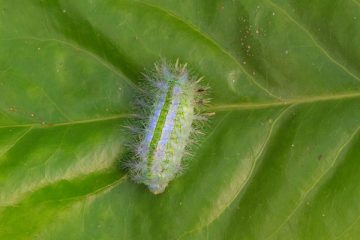
Codling moths like to eat apples, quinces, walnuts, pears, crab apples, and stone fruit like peaches and plums. To get rid of codling moths, spray trees with Neem oil at the beginning of the season, continuing weekly until you notice a reduction in grub activity.
Control Scale
A scale insect infestation can be devastating for garden trees and plants. They suck the sap from the plant’s leaves, causing them to turn yellow and die. Spraying the affected areas with Neem oil suffocates the scale insects, causing death.
Controlling Various Types of Adelgid
Adelgids are aphid-like insects that are responsible for killing entire forests of Carolina and Canadian hemlocks. They feed on tree sap, slowing their growth and eventually killing them. The newly hatched nymph stage of adelgids is vulnerable to Neem oil.
Spraying the affected areas between September and October helps reduce the impact on beneficial insects while killing the adelgids. For the best control, use a compression sprayer to apply the Neem oil.
Killing Sawflies
Sawflies love to eat old foliage and devour the needles of conifer trees. If you have a large infestation of sawflies, entire trees can be defoliated and eventually die. Neem oil is an excellent natural, biodegradable solution to kill unwanted sawflies.
Managing Lace Bugs
If you notice white or yellow stippling on the leaves of your flowers, or the leaves are curling, you may have a lace bug infestation. These tiny garden pests use sharp mouths to pierce plant foliage to suck out the juices in the leaves.
To rid your garden of lace bugs, spray a Neem oil insecticide on the undersides of the leaves, where these pests feed and reproduce.
Controlling Chinch Bugs
Like most damaging insects, chinch bugs are chewing insects. Like lace bugs, chinch bugs use slender beaks to suck the juices out of the grass, leaving behind yellowish/brown patches in the grass. They are resistant to most pesticides on the market, but can still be taken care of with Neem oil. Spray the affected areas with a Neem oil spray several times a week. (..)
Managing Crickets
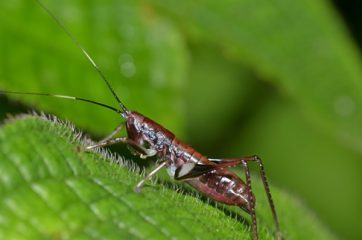
You usually find crickets in the garden late in the summer when plants and weeds begin to die. Crickets typically feed on tender shoots, young stems, and leaves of vegetable plants, and occasionally the patio furniture fabric.
Purchase Neem oil dust and sprinkle it around the garden to keep crickets from eating plants and simple, natural ways to kill spider crickets and other varieties.
Controlling Earwigs
While earwigs may look fearsome, because of the pair of pincers located at their tail end, they are harmless to humans. However, they can damage the plants in your garden. They tend to chew irregular, ragged holes in the leaves, flowers, and fruit of plants.
To safely treat the earwigs, spray foliage and flowers with a Neem oil and insecticidal soap mixture. You can make simple traps to get rid of earwigs in the house, too. All you need is some olive oil and soy sauce. The earwigs will be drawn to the liquid and drown.
Manage Flea Beetles
Although small, flea beetles can be incredibly destructive. They attack a broad range of vegetation, leaving tiny holes throughout the garden. To get rid of these pesky insects, spray Neem oil insecticide on the plants in your garden in the spring when the adult flea beetles emerge and start feeding on your plants.
Eliminate Squash Bugs and Stink Bugs
While squash and stink bugs are not the same, they feed on fruits and vegetables in the squash family. Spray these plants with Neem oil to get rid of stink bugs and keep them from eating watermelon, cucumbers, and summer squash.
As one of the best natural ways to kill a squash bug, the neem oil will minimize feeding and efficiently reduce damage to your garden. Neem oil kills stink bugs and squash bugs on contact and when used as a soil drench, deters the insects from the area.
Controlling Tent Caterpillars
Tent Caterpillars live throughout Canada and the U.S. and can quickly defoliate vast numbers of deciduous shrubs and trees in a short time. To get rid of these harmful insects, spray the foliage with Neem oil.
Controlling Mealybugs
The mealybug is an unarmored scale insect usually found in warmer climates and is a common problem in house plants and greenhouses. They destroy plants by inserting their stylets into them and draining the sap.
A small amount of this insect won’t cause significant damage to your plants. However, larger numbers can cause the plant to weaken as the leaves turn yellow and begin to curl. To use Neem oil to repel mealybugs and kill them, spray the affected plants. Neem oil will disrupt their growth and development and decrease their ability to feed.
Repel Mosquitoes
While mosquitoes don’t damage plants, they are incredibly annoying when you are trying to garden. Spraying Neem oil in your garden helps to keep mosquitoes out. You can also apply straight Neem oil to your skin to keep them away from you while you tend to your plants.
Neem Oil for Garden Use
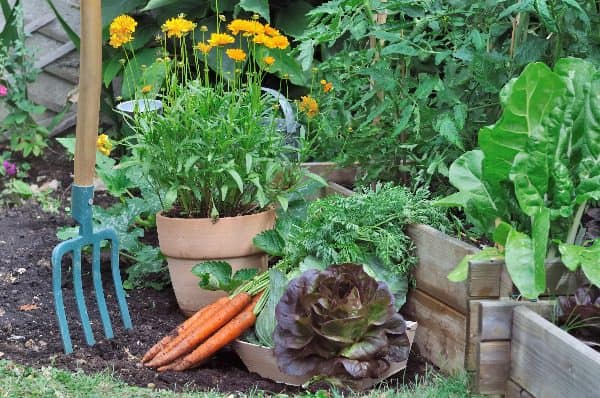
Neem oil extract is a safe, effective, and environmentally friendly fungicide. It can be sprayed on almost anything in your garden and yard to kill this fungus that is deadly to plants.
It is non-toxic, making it a great remedy for taking care of fungus that grows on vegetable plants, where it quickly spreads.
Controlling Black Spot Disease
One of the most common ailments rose bushes have is black spot disease. If unchecked, it damages your rose bushes. The Diplocarpon Rosae, a fungus that weakens and kills the leaves of your rose bushes, causes it. To treat this disease, prune plants, getting rid of infected leaves and stems, spray the entire plant with Neem oil foliar spray. Get both the tops and bottoms of the leaves and around the stem.
Eliminating Anthracnose
Anthracnose is a fungal disease that can defoliate an entire tree. If defoliation occurs repeatedly or the branches die because of the fungus, it can cause significant damage. The infection begins with small yellow, brown, or purple spots that darken as they age.
The spots eventually cover the entire leaf, making them look scorched, before dropping. To control the fungus, destroy infected leaves and prune dead wood. Apply 70% Neem oil to the area every 7-14 days until the fungus is gone.
Controlling Rust on Plants
The plants in your garden can succumb to more than 5,000 known species of rust. Rust on your plants is easily identifiable as rusty-yellow and bright orange spots on the leaves and stems of the plant. These spots are filled with a massive amount of viable spores and contribute to the decline of infected plants.
To control the spread of rust, you need to pick up infected foliage that has fallen from the plant. Spray Neem oil on the affected plants every week until you eradicate the infestation.
Controlling Plant Mildew
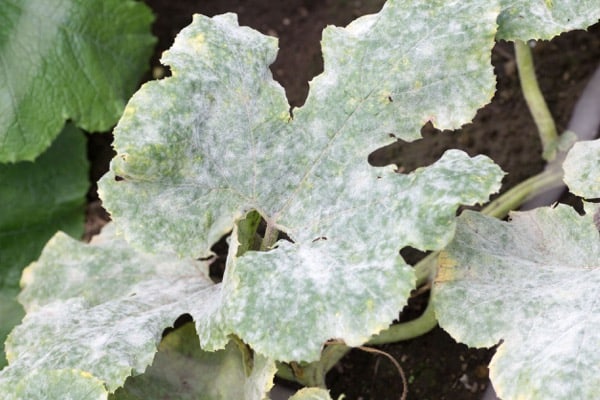
It’s important to note that neem oil does kill powdery mildew on a variety of plants. The powdery mildew that forms on plants like cucumbers and peonies can be effectively treated using Neem oil. It’s also ideal for zucchini growing problems. A parasitic fungus, the powdery mildew attaches itself to the plants and moves down into the roots to feed on the plant’s cells.
When the fungus moves into the plant’s cells, it causes damage to the foliage, resulting in yellow, curling leaves, or an accumulation of black or brown spots. To kill the fungus on plants or to get rid of white mold on grass, liberally spray with Neem oil, making sure you treat all the plant’s surfaces.
The way to use Neem oil for lawn fungus is simple, natural, and effective. Depending on the severity of the problem, re-treatment may be necessary.
Addressing Gray Mold or Botrytis Blight
Caused by the fungus Botrytis species, gray mold can infect soft fruits, vegetables, flowers, evergreen trees and shrubs, and trees. It starts affecting delicate plant tissues, like overripe fruit and old flowers, and can quickly spread to healthy plants. Spraying plants with Neem oil helps prevent this type of mold from forming. (..)
Treating Plant Diseases with Neem Oil
Many diseases that affect plants can be hard to eliminate, even with the harshest chemicals. Neem oil has been proven safe and efficient in treating many diseases in plants. Spraying your plants with Neem oil helps to control the disfiguring diseases that are common in plants.
Managing Fire Blight
A bacterial disease, fire blight causes sudden shriveling, wilting, and blackening of the shoots, blossoms, and fruit of individual trees. It occurs when the plants are in bloom and spreads through the bloom-bearing stem, turning it black.
The disease lays dormant in winter and begins actively growing in spring. To eliminate this bacterial disease, spray trees with Neem oil in the winter when they are dormant.
Fixing Verticillium Wilt
Plants that suffer from verticillium wilt have wilted, curled, and discolored leaves, resulting in eventual death. Symptoms appear in the fall and spring during mild temperatures.
Unfortunately, this plant disease is incurable, and it is a natural weed and grass killer. Remove any plants that have the disease. Use a Neem oil soil drench to kill the disease before it spreads to newly planted trees and shrubs.
How Does Neem Oil Work?
Neem oil is an ideal natural way to repel insects in the garden. It doesn’t rely on synthetic chemicals to kill the bugs. Its active ingredient, azadirachtin, causes the insects to lose their instincts. This results in bugs eating less over time.
When sprayed on plants, Neem oil halts insect development. When chewing and leaf-sucking insects eat leaves treated with Neem oil, the azadirachtin gets into their system and disrupts their regulatory hormones. This prevents them from transforming into their next stage of development. (..)
How is Neem Oil Made?
Manufacturers create Neem oil by crushing the Neem oil seeds from the Neem trees. Warm water, or a solvent, is then added to the oil to complete the process. There are different active chemicals within the Neem oil, depending on the method used.
Cold-pressed Neem oil seed is used to make some products on the market; others go through further processing of the Neem oil. (..)
Does Neem Oil Have Any Side Effects?
Neem oil is non-toxic, is safe to use, and has no known side effects.
Is Neem Oil Safe for Pets and Wildlife?

Unlike synthetic pesticides, Neem oil won’t build-up in the environment. No buildup means that it doesn’t leave toxic residue behind. While homemade bee spray with Neem oil works to keep bees away from you, it doesn’t harm these beneficial pollinators. Neem oil is safe for ladybugs and butterflies, too.
Neem oil comes from the Neem tree, which is an evergreen tree variety, known as Azadirachta Indica, that is native to India. As an organic product, it is biodegradable and has no unreasonable adverse effects, according to the Environmental Protection Agency. (..)
Are There Different Neem Oil Products?
There are a variety of Neem oil insecticide formulas and concentrations on the market you can use to get rid of fungus and insects from your garden. To help boost Neem oil’s ability to kill pests, mix it with insecticidal soap.
Is Neem Oil Harmful to Bees?
With a dwindling bee population, many commercial and private gardeners worry about using products that could potentially harm bees, further decreasing the population.
Neem oil can harm bees, wasps, and yellow jackets if used on plants during the day when bees are active. It is best used in the mornings or evenings when bee activity is minimal.
Where Can You Buy Neem Oil?
Purchase Neem oil insecticides, like Karanja Neem oil and Bonide Neem oil from home improvement stores, like Home Depot, the grocery store, Walmart, or your local nursery.
Pure Neem oil, like Southern AG or Dyna-Gro Neem oil, can be found online at stores like eBay and Amazon.
Neem Oil Spray Recipes
For each recipe, mix the ingredients and apply to plants.
If you love to garden, but hate dealing with insects and damaging fungus and disease that damages plants, you consider using a Neem oil spray.
This organic pest control product helps repel unwanted bugs and kills common fungal problems in your garden. Neem oil is a safe, non-toxic product to keep your plants insect-free and healthy.
In this article, we went over using neem oil for plants, using neem oil for your garden, and how to make neem oil spray for plants. For more neem oil uses, and the benefits of neem oil soap, check out our article, “39 Fascinating Uses and Benefits of Neem Oil.”
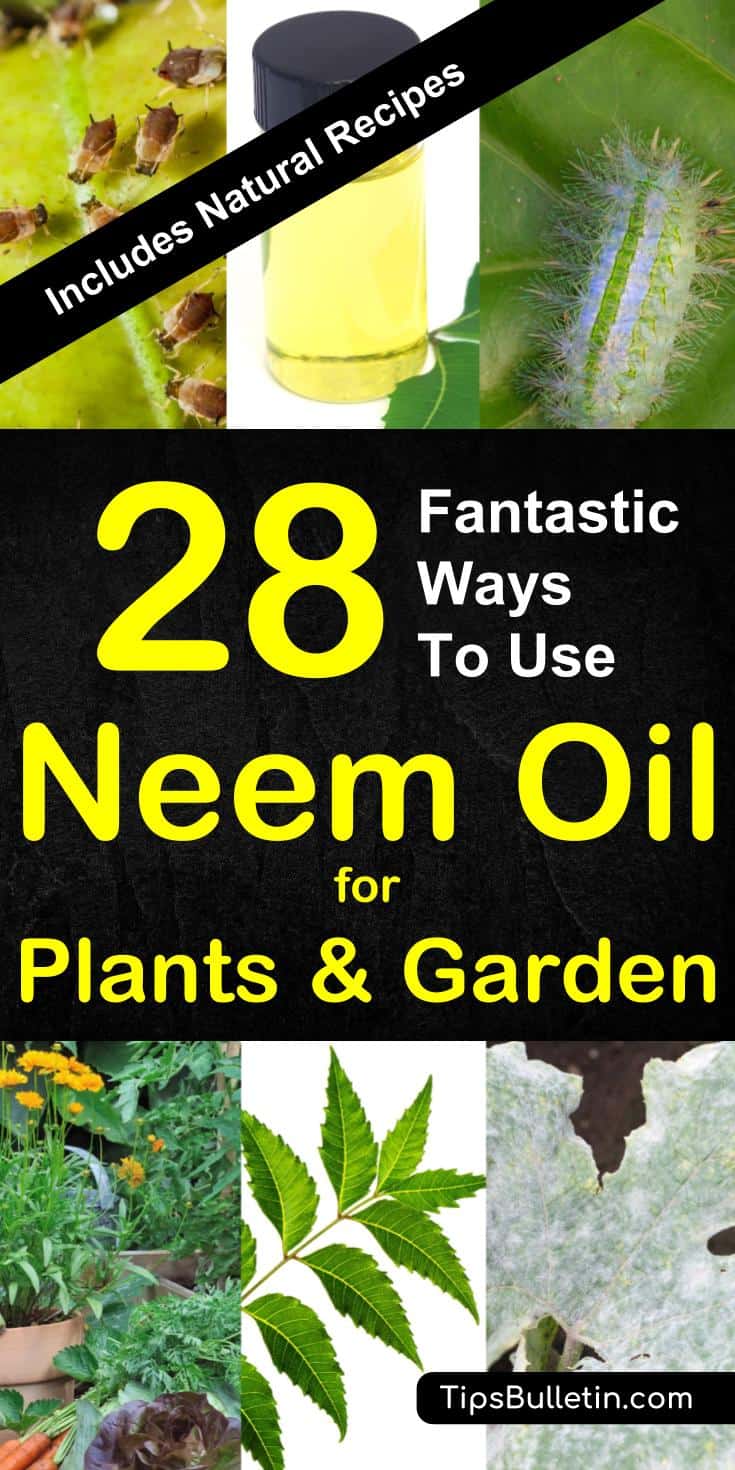
If you learned new ways to use Neem oil in the garden, please share it with friends and family that could benefit from this information.